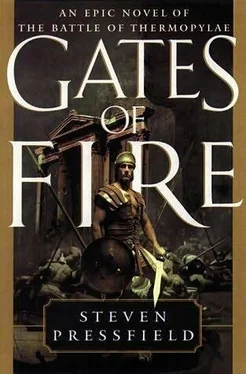Steven Pressfield - Gates of Fire - An Epic Novel of the Battle of Thermopylae
Здесь есть возможность читать онлайн «Steven Pressfield - Gates of Fire - An Epic Novel of the Battle of Thermopylae» весь текст электронной книги совершенно бесплатно (целиком полную версию без сокращений). В некоторых случаях можно слушать аудио, скачать через торрент в формате fb2 и присутствует краткое содержание. Жанр: Историческая проза, на английском языке. Описание произведения, (предисловие) а так же отзывы посетителей доступны на портале библиотеки ЛибКат.
- Название:Gates of Fire: An Epic Novel of the Battle of Thermopylae
- Автор:
- Жанр:
- Год:неизвестен
- ISBN:нет данных
- Рейтинг книги:3 / 5. Голосов: 1
-
Избранное:Добавить в избранное
- Отзывы:
-
Ваша оценка:
- 60
- 1
- 2
- 3
- 4
- 5
Gates of Fire: An Epic Novel of the Battle of Thermopylae: краткое содержание, описание и аннотация
Предлагаем к чтению аннотацию, описание, краткое содержание или предисловие (зависит от того, что написал сам автор книги «Gates of Fire: An Epic Novel of the Battle of Thermopylae»). Если вы не нашли необходимую информацию о книге — напишите в комментариях, мы постараемся отыскать её.
Gates of Fire: An Epic Novel of the Battle of Thermopylae — читать онлайн бесплатно полную книгу (весь текст) целиком
Ниже представлен текст книги, разбитый по страницам. Система сохранения места последней прочитанной страницы, позволяет с удобством читать онлайн бесплатно книгу «Gates of Fire: An Epic Novel of the Battle of Thermopylae», без необходимости каждый раз заново искать на чём Вы остановились. Поставьте закладку, и сможете в любой момент перейти на страницу, на которой закончили чтение.
Интервал:
Закладка:
My own wife and children served this farm as well. Neighbors visited from the adjoining landholdings. Prizes were awarded in whimsical categories; there was a country dance, outdoors on the threshing floor beside the laurel grove from which the farm derived its name, and various children's games were held, before the party settled in late afternoon to a communal feast beneath the trees, at which Dienekes himself and the lady Arete and their daughters did the serving. Gifts were exchanged, quarrels and grievances patched up, claims pressed and complaints aired. If a lad of the kleros sought betrothal to his sweetheart from the overhill farm, he might approach Dienekes now and claim his blessing.
Invariably two or three of the sturdier helot youths and men would be slated to accompany the army, as craftsmen or armorers, battle squires or javelineers. Far from resenting or seeking to shirk these perils, the young bucks reveled in the manly attention; their sweethearts clung to them throughout the day, and many a proposal of marriage was spawned in the wine-merry amorousness of these bright country afternoons.
By the time the merry party had put aside all desire for food and drink, as Homer says, more grain and fruit, wine and cakes and cheeses had been heaped at Dienekes' feet than he could carry into a hundred battles. He now retired to the courtyard table, with the elders of the farm, to conclude whatever details remained to set the affairs of the kleros in order before the march-out.
It was when the men had turned themselves to this business that the lady Arete motioned me to join her in private. We sat before a table in the farm kitchen. It was a cheerful spot, warm in the late sun that flooded through the courtyard doorway. The lad Idotychides, Rooster's boy, played outside with two other naked urchins, including my own son, Ska-mandridas. The lady's eyes rested for a moment, with sorrow it seemed, upon the roughhousing little fellows.
The gods remain always a jump ahead of us, don't they, Xeo?
This was the first hint I had received from her lips confirming that which none possessed the courage to ask: that the lady had indeed not foreseen the consequences of her action, that night of the krypteia, when she had saved the babe's life. She cleared a space upon the table. Into my care the lady placed, as ever, those articles of her husband's kit which it was a wife's responsibility to provide. The surgeon's packet, bound in the thick oxhide roll that doubled as a wrap for a splint or, bound flat atop the flesh, as seal for a puncture. The three curved needles of Egyptian gold, called by the Spartans fishhooks, with their spool of catgut twine and steel lancet, for use in the tailor's art of sewing flesh. The compresses of bleached linen, the tourniquet binders of leather, the copper dog bites, the needle-nosed grippers for extracting arrowheads or, more often, the shards and slivers that fly from the clash of steel upon iron and iron upon bronze.
Next, money. A cache of Aeginetan obols that, as all coin or currency, the warriors were forbidden to carry but which, discovered serendipitously within a squire's pack, would come in handy at some on-route market or beside the sutler's waggon, to procure forgotten necessaries or to purchase a treat to lift the heart.
Finally those articles of purely personal significance, the little surprises and charms, items of superstition, the private talismans of love. A girl's sketch in colored wax, a riband from a daughter's hair, a charm in amber carved by a child's untutored hand. Into my care the lady placed a packet of sweets and trifles, sesame cakes and candied figs. You may rifle your share, she said, smiling, but save a few for my husband.
There was always something for me. This day it was a pouch of coins of the Athenians, twenty in all, tetradrachms, nearly three months' pay for a skilled oarsman or hoplite of their army. I was astonished that the lady possessed such a sum, even of her own purse, and struck dumb at her extravagant generosity. These owls, as they were called from the image on their obverse, were good not just in the city of Athena but anywhere in Greece.
When you accompanied my husband on embassy to Athens last month, the lady broke my dumbstruck silence, did you find occasion to visit your cousin? Diomache. That is her name, isn't it?
I had and she knew it. This wish of mine, long-sought, had indeed at last been fulfilled. Dienekes had dispatched me upon the errand himself. Now I glimpsed a hint of the lady's pot-stirring. I asked if it was she, Arete, who had contrived it all.
We wives of Lakedaemon are forbidden fine gowns or jewelry or cosmetics. It would be heartless in the extreme, don't you think, to ban as well a little innocent intrigue?
She smiled at me, waiting.
Well? she asked.
Well, what?
My wife, Thereia, was gossiping with the other farm women, out in the courtyard. I squirmed.
My cousin is a married woman, lady. As I am a married man.
The lady's eyes threw sparks of mischief. You would not be the first husband bound by love to someone other than his wife. Nor she the first wife.
At once all teasing gaiety fled from the lady's glance. Her features became grave and shadowed, it seemed, with sorrow.
The gods played the same trick on my husband and me. She rose, indicating the door and the courtyard beyond. Come, let us take a walk.
The lady led barefoot up the slope to a shady spot beneath the oaks. In what country other than Lakedaemon would a noblewoman's soles be so thick with callus that they may tread upon the spiky leaves of oak and not feel their spiny barbs? You know, Xeo, that I was wife to my husband's brother before I was married to him.
This I did know, having learned it, as I said, from Dienekes himself.
Iatrokles was his name, I know you have heard the story. He was killed at Pellene, a hero's death, at thirty-one. He was the noblest of his generation, a Knight and a victor at Olympia, gifted by the gods with virtue and beauty much like Polynikes in this generation. He pursued me passionately, with such impetuousness that he called me from my father's house when I was still a girl. All this the Spartans know. But I will tell you something now which no one, except my husband, knows, The lady had reached a low bole of oak, a natural bench within the shade of the grove. She sat and indicated that I should take the place beside her.
Down there, she said, gesturing to the open space between two outbuildings and the track that led to the threshing floor. Right there where the path turns was where I first saw Dienekes. It was on a county day just like this. The occasion was Iatrokles' first march-out. He was twenty.
My father had brought me and my brother and sisters over from our own kleros with gifts of fruit and a yearling goat. The boys of the farm were playing, right there, when I came, holding my father's hand, over this knoll where you and I now sit.
The lady drew up. For a moment she searched my eyes, as if to make certain of their attention and understanding.
I saw Dienekes first from behind. Just his bare shoulders and the back of his head. I knew in an instant that I would love him and only him all my life.
Her expression grew sober before this mystery, the summons of Eros and the unknowable workings of the heart.
I remember waiting for him to turn, so I could see him, see his face. It was so odd. In a way it was like an arranged match, where you wait with your heart fluttering to behold the face you will and must love.
At last he turned. He was wrestling another boy. Even then, Xeo, Dienekes was unhandsome.
You could hardly believe he was his brother's brother. But to my eyes he appeared eueidestatas, the soul of beauty. The gods could not have crafted a face more open or touching to my heart. He was thirteen then. I was nine.
Читать дальшеИнтервал:
Закладка:
Похожие книги на «Gates of Fire: An Epic Novel of the Battle of Thermopylae»
Представляем Вашему вниманию похожие книги на «Gates of Fire: An Epic Novel of the Battle of Thermopylae» списком для выбора. Мы отобрали схожую по названию и смыслу литературу в надежде предоставить читателям больше вариантов отыскать новые, интересные, ещё непрочитанные произведения.
Обсуждение, отзывы о книге «Gates of Fire: An Epic Novel of the Battle of Thermopylae» и просто собственные мнения читателей. Оставьте ваши комментарии, напишите, что Вы думаете о произведении, его смысле или главных героях. Укажите что конкретно понравилось, а что нет, и почему Вы так считаете.












